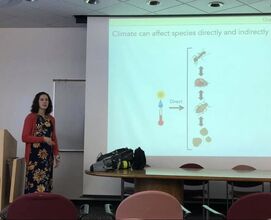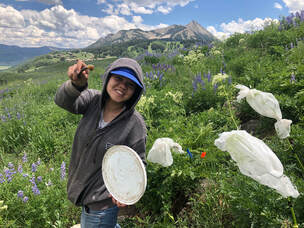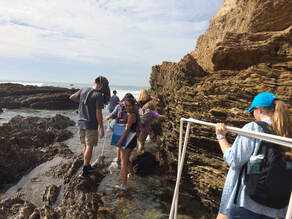Teaching philosophy
My goal is to excite students to become engaged in scientific inquiry and discovery and to train the future generation of scientists. I aim to also promote scientific literacy and trust in science for all students, particularly about key yet highly politicized topics such as evolution, climate change, and public health. Overall, I help students develop tools for thinking critically about the natural sciences and gain an understanding and appreciation for the natural world and the complexity of life. To do so, my teaching is based on four main goals:
- To engage students as active learners and promote collaboration,
- To emphasize the scientific process and field-based learning, and
- To showcase the perspectives and contributions of diverse scientists and promote an anti-racist learning environment.
Teaching experience and interests
I have taught or served as a teaching assistant for 11 semesters of undergraduate-level courses at UC Irvine and Oberlin College, including Introductory Biology laboratory and discussion sections, upper-level Field Ecology, and an upper-level writing course in Global Sustainability. I also designed an co-instructed a unique and non-traditional interdisciplinary course examining the profound ways in which human excrement shapes science, society, and the environment. Through these experiences, and by participating in four pedagogy and mentoring excellence training courses, I have developed tools for creatively and effectively engaging students from a diversity of backgrounds and interests.
In the future, I hope to continue to teach laboratory, lecture, and field courses such as Introductory Biology, Global Change Biology, Tropical Ecology field course in Costa Rica, Population and Community Ecology, and Chemical Ecology.
In the future, I hope to continue to teach laboratory, lecture, and field courses such as Introductory Biology, Global Change Biology, Tropical Ecology field course in Costa Rica, Population and Community Ecology, and Chemical Ecology.
Mentoring and tutoring
I have tutored and closely mentored 15+ high school, undergraduate, and graduate students in field ecology research, chemistry, math, data analysis, and writing. At the Rocky Mountain Biological Laboratory, I have advised three undergraduate students conducting 10-week independent research projects and one high school student in field ecology research, with positive outcomes (e.g., publishing papers, transferring from community colleges to four-year universities, and obtaining biology-related jobs). I have also advised three undergraduate students in chemical ecology research in the lab at Virginia Tech, as well as two students applying to graduate programs as a part of the Ecology and Evolutionary Biology Mentor Match Program. My overall goal is to continue to actively recruit and mentor students from diverse backgrounds and support them as they pursue their career goals.
|
Annika presenting on ecological field research at UC Irvine.
|
Undergraduate REU student Nhan Nguyen applying a sticky paste and placing mesh bags on plants to experimentally exclude insects near the Rocky Mountain Biological Laboratory.
|
UC Irvine Field Biology students studying tide pools at Crystal Cove State Park.
|
Outreach and Service
I am committed to advocating for diversity, equity, and inclusion (DEI) in the natural sciences and at biological field stations. Due to their remote and non-traditional settings, field stations have historically struggled to recruit and retain diverse scientists while promoting a safe and inclusive culture. For two years, I chaired the Diversity and Inclusion Committee at the Rocky Mountain Biological Station (RMBL), one of the world’s oldest and most prominent field stations that supports 180+ faculty and students annually. In this role, I worked with RMBL administrators and the Board of Trustees to transform policies and practices surrounding DEI at the station. I also organized and led multiple discussions and workshops aimed at promoting the recruitment and retention of diverse researchers at the station. In the future, I will continue to advocate for DEI at biological field stations and actively recruit and support diverse undergraduate and graduate students in research, especially women, students of color, first-generation, and community college transfer students.



